Premium Only Content
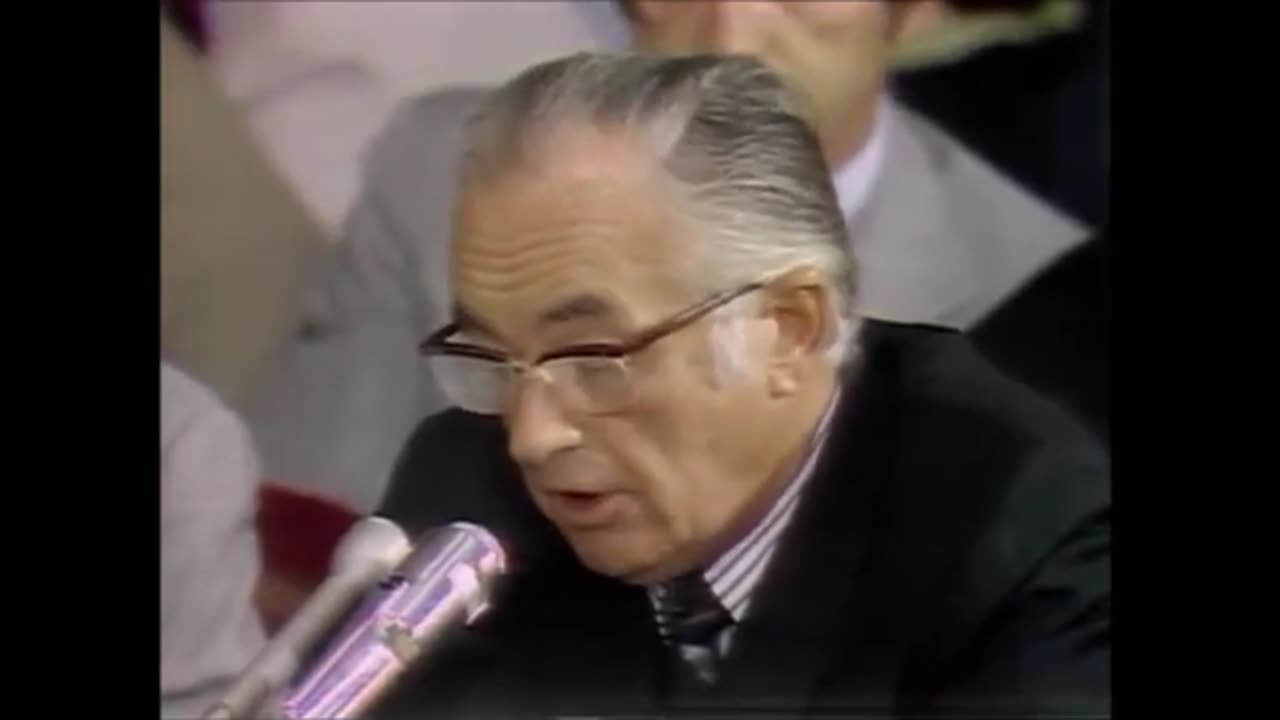
Watergate Hearings Day 10: Maurice Stans (1973-06-13)
The dark side of history: https://thememoryhole.substack.com/
The Watergate scandal refers to the burglary and illegal wiretapping of the headquarters of the Democratic National Committee, in the Watergate complex by members of President Richard Nixon's re-election campaign, and the subsequent cover-up of the break-in resulting in Nixon's resignation on August 9, 1974, as well as other abuses of power by the Nixon White House that were discovered during the course of the scandal.
1960s
November 5, 1968: Richard Nixon elected President.[1]
January 20, 1969: Richard Nixon is inaugurated as the 37th President of The United States.
1970s
July 1, 1971: David Young and Egil "Bud" Krogh write a memo suggesting the formation of what later became the "White House Plumbers" in response to the leak of the Pentagon Papers by Daniel Ellsberg.
August 21, 1971: Nixon's Enemies List is started by White House aides (though Nixon himself may not have been aware of it); to "use the available federal machinery to screw our political enemies."
September 3, 1971: "White House Plumbers" E. Howard Hunt, G. Gordon Liddy, and others break into the offices of Daniel Ellsberg's psychiatrist Lewis Fielding looking for material that might discredit Ellsberg, under the direction of John Ehrlichman or his staff within the White House. This was the Plumbers' first major operation.[2]
By early 1972, the Plumbers, at this stage assigned to the Committee to Re-Elect the President (abbreviated CRP, but often mocked by the acronym CREEP[3]), had become frustrated at the lack of additional assignments they were being asked to perform, and that any plans and proposals they suggested were being rejected by CRP. Liddy and Hunt took their complaints to the White House – most likely to Charles Colson – and requested that the White House start putting pressure on CRP to assign them new operations. It is likely that both Colson and White House Chief of Staff H.R. Haldeman did so, starting the chain of events that led to the Watergate break-ins a few months later. This narrative was confirmed in the famous "Cancer on the Presidency" conversation between Nixon and White House Counsel John Dean on March 21, 1973.[4]
May 2, 1972: J. Edgar Hoover dies; L. Patrick Gray is appointed acting FBI director.[5]
May 28, 1972: Liddy’s team breaks into DNC Headquarters at the Watergate complex for the first time, bugging the telephones of staffers.[6]
June 17, 1972: The plumbers are arrested at 2:30 a.m. in the process of burglarizing and planting surveillance bugs in the Democratic National Committee offices at the Watergate Building Complex.
June 19, 1972: Despite efforts by Steve King, Martha Mitchell acquires a copy of the Los Angeles Times, and recognizes the name of one of the Watergate burglars, James W. McCord Jr., security director of the CRP.[7]
June 20, 1972: Reportedly based on a tip from Deep Throat (associate director of the FBI Mark Felt), Bob Woodward reports in The Washington Post that one of the burglars had E. Howard Hunt in his address book and possessed checks signed by Hunt, and that Hunt was connected to Charles Colson. On the same day, Nixon and Haldeman have a conversation that is recorded by the White House taping system. Eighteen and a half minutes of this conversation will later be erased.[8]
June 23, 1972: In the Oval Office, H.R. Haldeman recommends to President Nixon that they attempt to shut down the FBI investigation of the Watergate break-in, by having CIA Director Richard Helms and Deputy Director Vernon A. Walters tell acting FBI Director L. Patrick Gray to, "Stay the hell out of this". Haldeman expects Gray will then seek and take advice from Deputy FBI Director Mark Felt, and Felt will obey direction from the White House out of ambition. Nixon agrees and gives the order.[9] The conversation is recorded.
September 15, 1972: Hunt, Liddy, and the Watergate burglars are indicted by a federal grand jury.
November 7, 1972: Nixon re-elected, defeating George McGovern with the largest plurality of votes in American history.
January 8, 1973: Five defendants plead guilty as the burglary trial begins. Liddy and James W. McCord Jr. are convicted after the trial.
January 20, 1973: Nixon is inaugurated for his second term.
February 28, 1973: Confirmation hearings begin for confirming L. Patrick Gray as permanent Director of the FBI. During these hearings, Gray reveals that he had complied with an order from John Dean to provide daily updates on the Watergate investigation, and also that Dean had "probably lied" to FBI investigators.
March 17, 1973: Watergate burglar McCord writes a letter to Judge John Sirica, claiming that some of his testimony was perjured under pressure and that the burglary was not a CIA operation, but had involved other government officials, thereby leading the investigation to the White House.
March 21, 1973: Dean tells Nixon there is a "cancer" on the presidency.
March 23, 1973: The McCord letter is made public by Judge Sirica in open court at McCord's sentencing hearing.
April 6, 1973: White House counsel John Dean begins cooperating with federal Watergate prosecutors.
April 27, 1973: L. Patrick Gray resigns after it comes to light that he destroyed files from E. Howard Hunt's safe. William Ruckelshaus is appointed as his replacement.
April 30, 1973: Senior White House administration officials Ehrlichman, Haldeman, and Richard Kleindienst resign, and John Dean is fired.
May 17, 1973: The Senate Watergate Committee begins its nationally televised hearings.
May 19, 1973: Independent special prosecutor Archibald Cox appointed to oversee investigation into possible presidential impropriety.
June 3, 1973: John Dean tells Watergate investigators that he has discussed the cover-up with Nixon at least 35 times.
July 13, 1973: Alexander Butterfield, former presidential appointments secretary, reveals that all conversations and telephone calls in Nixon's office have been taped since 1971.
July 18, 1973: Nixon orders White House taping systems disconnected.
July 23, 1973: Nixon refuses to turn over presidential tapes to the Senate Watergate Committee or the special prosecutor.
Vice President replaced:
October 10, 1973: Spiro Agnew resigns as Vice President of the United States due to corruption while he was the governor of Maryland.
October 12, 1973: Gerald Ford is nominated as vice president under the 25th Amendment.
October 20, 1973: "Saturday Night Massacre" – Nixon orders Elliot Richardson and Ruckelshaus to fire special prosecutor Cox. They both refuse to comply and resign. Robert Bork considers resigning but carries out the order.
November 1, 1973: Leon Jaworski is appointed new special prosecutor.
November 17, 1973: Nixon delivers "I am not a crook" speech at a televised press conference at Disney World (Florida).
November 27, 1973: the Senate votes 92 to 3 to confirm Ford as vice president.
December 6, 1973: the House votes 387 to 35 to confirm Ford as vice president, and he takes the oath of office an hour after the vote.
January 28, 1974: Nixon campaign aide Herbert Porter pleads guilty to perjury.
February 25, 1974: Nixon personal counsel Herbert Kalmbach pleads guilty to two charges of illegal campaign activities.
March 1, 1974: In an indictment against seven former presidential aides, delivered to Judge Sirica together with a sealed briefcase intended for the House Committee on the Judiciary, Nixon is named as an unindicted co-conspirator.
March 4, 1974: The "Watergate Seven" (Mitchell, Haldeman, Ehrlichman, Colson, Gordon C. Strachan, Robert Mardian, and Kenneth Parkinson) are formally indicted.
March 18, 1974: Judge Sirica orders the grand jury's sealed report to be sent to the House Committee on the Judiciary.
April 5, 1974: Dwight Chapin convicted of lying to a grand jury.
April 7, 1974: Ed Reinecke, Republican lieutenant governor of California, indicted on three charges of perjury before the Senate committee.
April 16, 1974: Special Prosecutor Jaworski issues a subpoena for 64 White House tapes.
April 30, 1974: White House releases edited transcripts of the Nixon tapes, but the House Judiciary Committee insists the actual tapes must be turned over.
May 9, 1974: Impeachment hearings begin before the House Judiciary Committee.
June 15, 1974: Woodward and Bernstein's book All the President's Men is published by Simon & Schuster (ISBN 0-671-21781-X).
July 8, 1974: The United States Supreme Court hears oral argument in United States v. Nixon.
July 24, 1974: United States v. Nixon decided: Nixon is ordered to give up tapes to investigators.
Congress moves to impeach Nixon.
July 27 to July 30, 1974: House Judiciary Committee passes Articles of Impeachment.
Early August 1974: A previously unknown tape from June 23, 1972 (recorded a few days after the break-in) documenting Nixon and Haldeman formulating a plan to block investigations is released. This recording later became known as the "Smoking Gun".
Key Republican Senators tell Nixon that enough votes exist to convict him.
August 8, 1974: Nixon delivers his resignation speech in front of a nationally televised audience.
August 9, 1974: Nixon resigns from office and Ford becomes president.
September 8, 1974: President Ford ends the investigations by granting Nixon a pardon.
October 17, 1974: Ford testifies before Congress on the pardon, the first sitting president to testify before Congress since President Lincoln.
November 7, 1974: 94th Congress elected: Democratic Party picks up 5 Senate seats and 49 House seats. Many of the freshman congressmen are very young; the media dubs them "Watergate Babies".
December 31, 1974: As a result of Nixon administration abuses of privacy, Privacy Act of 1974 passes into law.
January 1, 1975: John N. Mitchell, John Ehrlichman and H. R. Haldeman convicted of conspiracy, obstruction of justice and perjury.
July 27, 1975: Church Committee, chaired by Frank Church, commences to investigate foreign and domestic intelligence-gathering activities.
November 4, 1975: Ford replaces several Nixon cabinet members in the "Halloween Massacre", engineered by Ford aide Donald Rumsfeld. Richard Cheney, George H. W. Bush and Brent Scowcroft join Ford administration; Rumsfeld becomes Secretary of Defense; Henry Kissinger remains as Secretary of State but not National Security Advisor.
May 5, 1976: Church Committee superseded by Senate Select Committee on Intelligence.
November 2, 1976: Ford is defeated in the United States presidential election by Jimmy Carter.
January 20, 1977: Jimmy Carter is inaugurated as the 39th President of The United States.
May 4, 1977: Nixon gives his first major interview about Watergate with TV journalist David Frost.
May 15, 1978: Nixon publishes his memoirs, giving more of his side of the Watergate saga.
October 25, 1978: Foreign Intelligence Surveillance Act enacted, creating Foreign Intelligence Surveillance Court and limiting federal government domestic surveillance powers. Recommended by Church Committee.
1990s
May, 1990: Publication of Wars of Watergate by Stanley Kutler, often cited as the definitive history of the Watergate Scandal.[10]
January, 1992: Publication of Silent Coup by journalists Len Colodny and Robert Gettlin, blaming Watergate burglary on John Dean who wanted to cover up involvement of his fiancée with a call-girl ring. Book endorsed by Liddy in his first major statement about Watergate case, prompting Dean to sue Liddy, Colodny and Gettlin for defamation. Dean's case was dismissed and settled out of court; DNC secretary Ida "Maxine" Wells, also implicated by Liddy in call-girl cover-up, sued for defamation but jury in that case deadlock and judge dismissed case in 2001.[11] The book, often dismissed as a revisionist, pro-Nixon apology or conspiracy theory, was also endorsed by Roger Stone.[12]
April 22, 1994: Richard Nixon dies aged 81, after suffering a stroke. In keeping with his own wishes, he was not given a state funeral, though his funeral service five days later was a high-profile affair, attended by all five living U.S. Presidents and a host of other VIPs.
2000s
May 31, 2005: W. Mark Felt, former Associate Director of the FBI during the Watergate years, declares that he is Deep Throat; this declaration was later confirmed by reporters Bob Woodward and Carl Bernstein, although it was disputed by some writers.
References
Gerhard Peters. "The American Presidency Project Election of 1968". ucsb.edu. Archived from the original on 2016-09-28.
Owen Edwards; Smithsonian Magazine (October 2012). "The World's Most Famous Filing Cabinet: After Daniel Ellsberg leaked the Pentagon Papers, the infamous Plumbers broke into his psychiatrist's office, looking for a way to discredit him". smithsonianmag.com.
Joan Hoff (2010). L. Edward Purcell (ed.). Richard Milhous Nixon. Vol. Vice Presidents: A Biographical Dictionary. Infobase Publishing. p. 351. ISBN 978-1-4381-3071-2.
Richard Nixon Presidential Library and Museum. "Transcript of a recording of a meeting among the President, John Dean, and H.R. Haldeman in the Oval Office, on March 21, 1973, from 10:12 to 11:55 AM" (PDF). nixonlibrary.gov. Archived (PDF) from the original on February 22, 2013.
Henry B. Hogue; Federation of American Scientists (March 17, 2005). "Nomination and Confirmation of the FBI Director: Process and Recent History" (PDF). fas.org. Archived (PDF) from the original on March 4, 2016.
"The Watergate Scandal: A Timeline".
Killian, Katie (2019-08-01). "Slow Burn. Leon Neyfakh. Slate, The Slate Group, a Graham Holdings Company. https://slate.com/slow-burn. 2017". The Oral History Review. 46 (2): 426–427. doi:10.1093/ohr/ohz018. ISSN 0094-0798. {{cite journal}}: External link in |title= (help)
"The Watergate tapes' infamous 18.5-minute gap and Nixon's secretary's unusual explanation for it". ABC News. Retrieved 2022-06-13.
"The Watergate Story | Nixon Resigns". The Washington Post. Archived from the original on 2016-11-25. Retrieved 2016-12-30.
"Stanley I. Kutler, Historian Who Got Nixon Tapes Released, Dies at 80". New York Times. April 11, 2015.
"Liddy Case Dismissed Jury Unable To Reach A Verdict After Deliberating 8 Hours". CBS News. February 1, 2001. Archived from the original on September 1, 2006.
"Mark Levin has warned before of Obama's 'silent coup.' Now he has a follower in the Oval Office". Washington Post. March 26, 2017.
Bernstein, C., & Woodward, B. (1974). All the President's Men. New York: Pocket Books.
vte
Richard Nixon
37th President of the United States (1969–1974) 36th Vice President of the United States (1953–1961) U.S. Senator from California (1950–1953) U.S. Representative for CA–12 (1947–1950)
Pre-presidency
Checkers speech Vice presidency
Presidential transition of Dwight D. Eisenhower 1958 motorcade attack Kitchen Debate Operation 40 Presidential transition of John F. Kennedy
Presidency
(timeline)
Transition First inauguration Second inauguration "Bring Us Together" Silent majority 1970 Lincoln Memorial visit State of the Union Address (1970 1973 1974) Wilson desk Judicial appointments
Supreme Court controversies Executive Orders Presidential Proclamations
Foreign policy
Nixon Doctrine Vietnam War
Cambodian bombing Paris Peace Accords "Peace with Honor" Vietnamization Cold War period
Linkage policy Tar Baby Option 1972 visit to China
Shanghai Communiqué 1973 Chilean coup d'état Détente
1972 Moscow Summit Anti-Ballistic Missile Treaty SALT I Treaty Prevention of Nuclear War Agreement Threshold Test Ban Treaty Operation CHAOS Space exploration
Economic policy
Bank Secrecy Act Fair Credit Reporting Act National Highway Traffic Safety Administration Urban Mass Transportation Act of 1970 Federal-Aid Highway Act of 1973 Nixon shock
Economic Stabilization Act of 1970 Smithsonian Agreement Occupational Safety and Health Act
National Institute for Occupational Safety and Health Occupational Safety and Health Administration Permissible exposure limit U.S. Consumer Product Safety Commission
Consumer Product Safety Act Lead-Based Paint Poisoning Prevention Act Poison Prevention Packaging Act of 1970 Public Health Cigarette Smoking Act Securities Investor Protection Act
Securities Investor Protection Corporation Tax Reform Act of 1969
Alternative minimum tax Revenue Act of 1971 Agricultural Act of 1970 Farm Credit Act of 1971 Consolidated Farm and Rural Development Act of 1972 Agriculture and Consumer Protection Act of 1973 Emergency Petroleum Allocation Act Emergency Daylight Saving Time Energy Conservation Act Trans-Alaska Pipeline Authorization Act
Environmental
policy
Council on Environmental Quality
Environmental Quality Improvement Act National Environmental Policy Act Environmental Protection Agency
Clean Air Amendments of 1970 Clean Water Act Federal Insecticide, Fungicide, and Rodenticide Act National Ambient Air Quality Standards National Emissions Standards for Hazardous Air Pollutants New Source Performance Standards Noise Control Act Reorganization Plan No. 3 of 1970 National Oceanic and Atmospheric Administration Coastal Zone Management Act
Coastal Zone Management Program Great Lakes Water Quality Agreement Marine Protection, Research, and Sanctuaries Act of 1972 Endangered Species Act of 1969 Endangered Species Act of 1973 Oil Pollution Act of 1973 Water Resources Development Act of 1974
Social policy
Family Assistance Plan Revised Philadelphia Plan Minority Business Development Agency Native American policy
Alaska Native Claims Settlement Act Education Amendments of 1972
Title IX National Cancer Act of 1971 End Stage Renal Disease Program Health Maintenance Organization Act of 1973 Drug Abuse Prevention and Control Act Shafer Commission War on Drugs
Drug Enforcement Administration Cannabis policy Federal Contested Elections Act Federal Election Campaign Act Voting Rights Act Amendments of 1970 District of Columbia Home Rule Act
Watergate
Timeline
Operation Sandwedge Operation Gemstone Saturday Night Massacre CRP White House Plumbers Watergate Seven Enemies List
list of opponents White House tapes United States v. Nixon (1974) Senate Watergate Committee
impeachment process "I am not a crook" Resignation
speech Pardon
Life and
politics
Richard Nixon Foundation Presidential Library and Museum Birthplace and boyhood home "Last press conference" Florida White House "La Casa Pacifica" Nixon Center Nixon v. General Services Administration (1977) Nixon v. Fitzgerald (1982) Death and state funeral
Books
Six Crises (1962) Bibliography
Elections
U.S. House of Representatives: 1946 1948 U.S. Senate: 1950 California gubernatorial election: 1962 GOP presidential primaries: 1960 1964 1968 1972 GOP national conventions: 1952 1956 1960 1968
campaign 1972 Presidential elections: 1952 1956 1960
debates 1968 1972
Popular
culture
"Nixon goes to China" Millhouse (1971 film) An Evening with Richard Nixon (1972 play) Richard (1972 film) Another Nice Mess (1972 film) Four More Years (1972 film) Impeach the President (1973 song) The Werewolf of Washington (1973 film) White House Madness (1975 film) All the President's Men (1976 film) The Public Burning (1977 novel) Washington: Behind Closed Doors (1977 miniseries) Secret Honor (1984 film) Nixon in China (1987 opera) The Final Days (1989 film) Nixon (1995 film) Elvis Meets Nixon (1997 film) Futurama (1999 TV series) Dick (1999 film) Nixon's China Game (2000 film) Dark Side of the Moon (2002 film) The Assassination of Richard Nixon (2004 film) Frost–Nixon interviews (2006 play, 2008 film) Black Dynamite (2009 film) "The Impossible Astronaut" (2011 TV episode) Our Nixon (2013 film) X-Men: Days of Future Past (2014 film) Crooked (2015 novel) Elvis & Nixon (2016 film) The Post (2017 film) Watergate (2019 board game) U.S. postage stamp
Related
Presidential Recordings and Materials Preservation Act Presidential Townhouse Richard Nixon mask
Staff
Jack Brennan (aide de camp) Murray Chotiner (early campaign manager) Manolo Sanchez (valet) Rose Mary Woods (secretary)
Family
Thelma "Pat" Ryan Nixon (wife) Tricia Nixon Cox (daughter) Julie Nixon Eisenhower (daughter) Christopher Nixon Cox (grandson) Jennie Eisenhower (granddaughter) Francis A. Nixon (father) Hannah Milhous Nixon (mother) Donald Nixon (brother) Edward Nixon (brother)
← Lyndon B. Johnson Gerald Ford →
← Alben W. Barkley Lyndon B. Johnson →
-
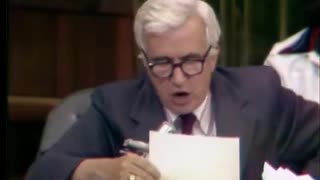 3:50:14
3:50:14
The Memory Hole
1 month agoNixon Impeachment Hearings Day 2 (1974-07-24)
675 -
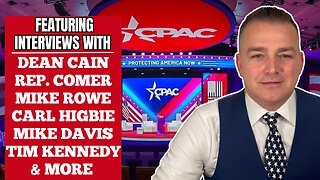 2:04:44
2:04:44
TheAlecLaceShow
18 hours agoLive at CPAC | Interviews with Dean Cain, Rep. Comer and more! | The Alec Lace Show
57.2K3 -
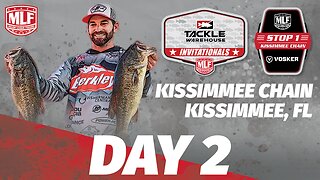 LIVE
LIVE
Major League Fishing
3 days agoLIVE Tackle Warehouse Invitationals, Stop 1, Day 2
347 watching -
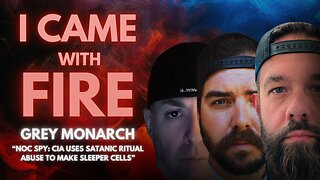 3:12:37
3:12:37
I_Came_With_Fire_Podcast
15 hours agoNOC Spy: CIA uses SATANIC RITUAL ABUSE to make SLEEPER Cells
69.1K10 -
 28:42
28:42
CatfishedOnline
1 day ago $2.88 earnedWoman Insists Morgan Wallen Relationship Isn't a Romance Scam!
45.8K2 -
 16:25
16:25
TSPLY
1 day agoNew CNN / MSNBC Meltdown Moments Of Getting Mad At Donald Trump In February
45.1K29 -
 8:33
8:33
scoutthedoggie
8 hours agoAirsoft War Games Scotland
61.5K7 -
 4:56
4:56
Kirill MultitoolOfficial
1 day ago $4.12 earnedSurvival TIPS and usefull bushcraft DIY in the wild
63.6K4 -
 27:25
27:25
ArturRehi
1 day agoThis is How Dictatorships are Formed
39.3K7 -
 59:35
59:35
AlaskanBallistics
21 hours ago $1.28 earnedI Love this Gun Episode # 11
26.8K1